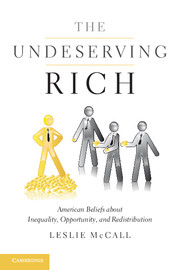Book contents
- Frontmatter
- Contents
- Tables and Figures
- Preface and Acknowledgments
- Introduction: Thinking about Income Inequality
- 1 Beyond the Opposition between Opportunity and Inequality
- 2 The Emergence of a New Social Issue
- 3 American Beliefs about Income Inequality
- 4 Why Do Americans Care about Income Inequality?
- 5 Americans' Social Policy Preferences in the Era of Rising Inequality
- Conclusion: A New Era of Beliefs about Inequality
- Notes
- References
- Index
5 - Americans' Social Policy Preferences in the Era of Rising Inequality
Published online by Cambridge University Press: 05 April 2013
- Frontmatter
- Contents
- Tables and Figures
- Preface and Acknowledgments
- Introduction: Thinking about Income Inequality
- 1 Beyond the Opposition between Opportunity and Inequality
- 2 The Emergence of a New Social Issue
- 3 American Beliefs about Income Inequality
- 4 Why Do Americans Care about Income Inequality?
- 5 Americans' Social Policy Preferences in the Era of Rising Inequality
- Conclusion: A New Era of Beliefs about Inequality
- Notes
- References
- Index
Summary
Although a vast industry of poll takers and scholars is in the business of tracking every contour of American policy attitudes, we know almost nothing about the impact of rising income inequality on social policy preferences. The American Political Science Association's (APSA) Task Force on Inequality and American Democracy emphasized the importance of this omission in its 2004 report. It tried to capture what we know about enduring attitudes toward inequality, opportunity, and government redistribution, but it was unable to document whether these had changed in any significant way in response to the steep rise in income inequality over the past several decades. Since the publication of the report nearly a decade ago, the question remains unexplored. This is especially surprising given the growing number of scholars interested in the policy implications of rising income inequality, as well as a new emphasis on the vital role that policy attitudes play in shaping welfare-state spending.
Although the APSA Task Force report identified data limitations as the primary reason for our lack of progress on this question, a claim with which we agree and will discuss in a moment, there are theoretical shortcomings at play as well, and these are at least as noteworthy as the data limitations. As described in previous chapters, there is a far richer and more nuanced literature on American views about inequality, opportunity, and redistribution than is on display in current discussions of public opinion about rising inequality. On the subject of policy preferences in particular, the lion's share of attention is devoted to only two views, and both have led to dead ends.
- Type
- Chapter
- Information
- The Undeserving RichAmerican Beliefs about Inequality, Opportunity, and Redistribution, pp. 186 - 218Publisher: Cambridge University PressPrint publication year: 2013

